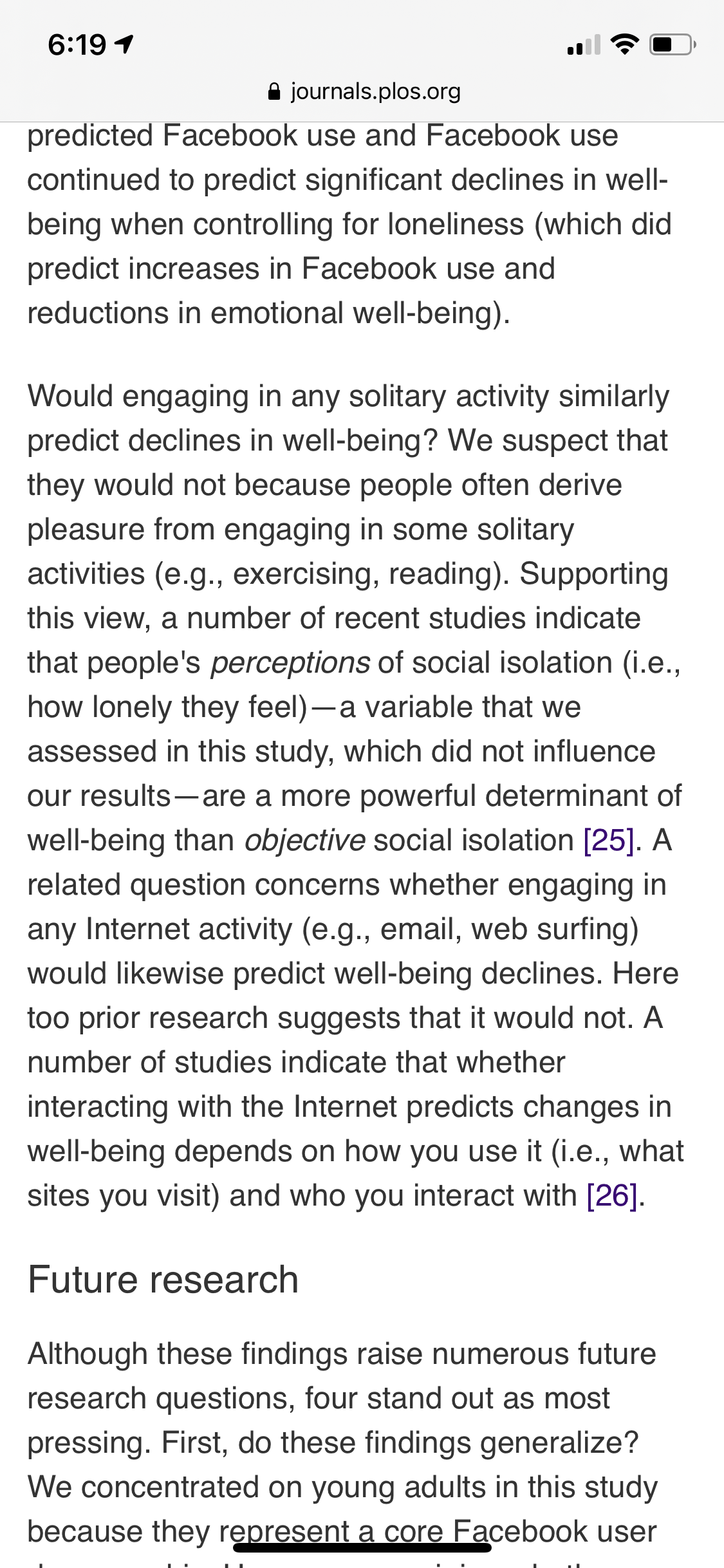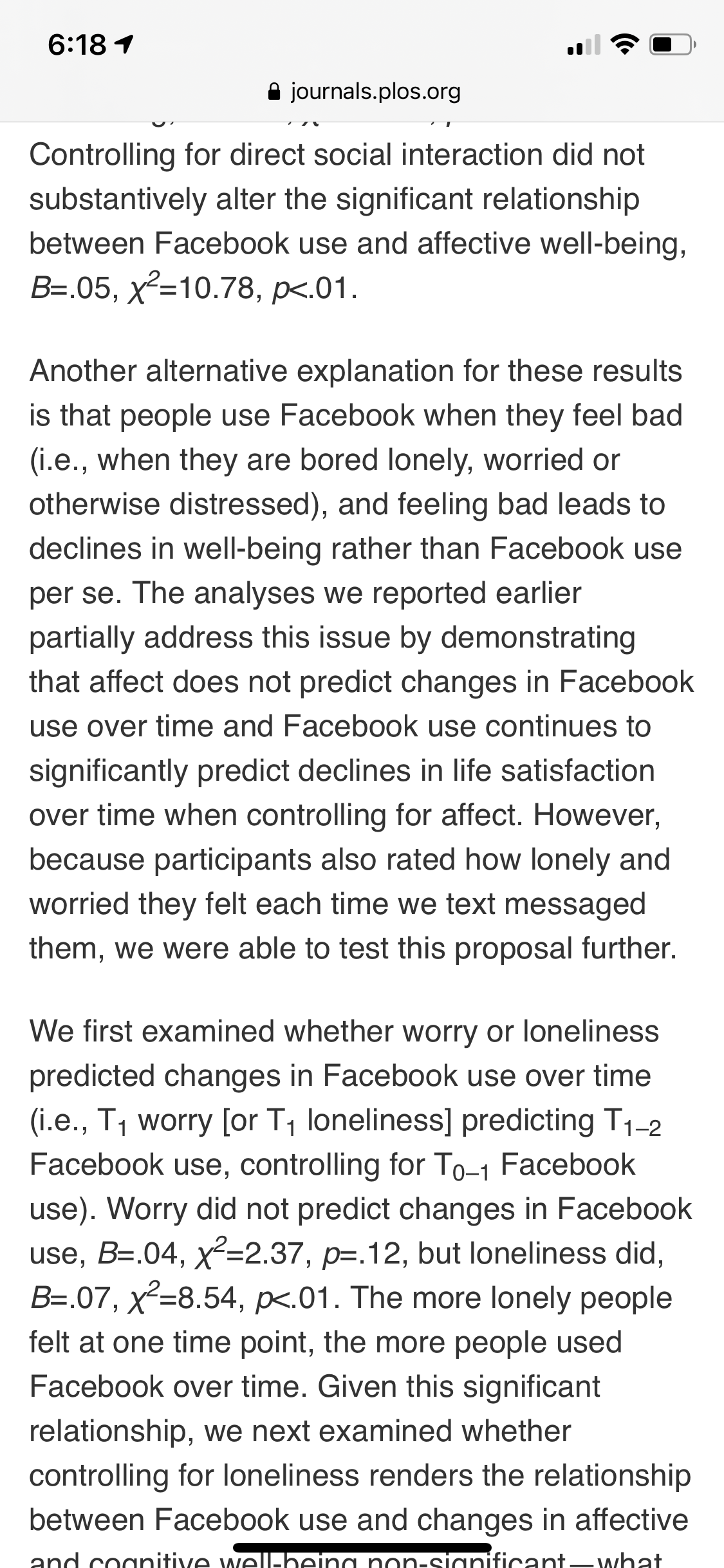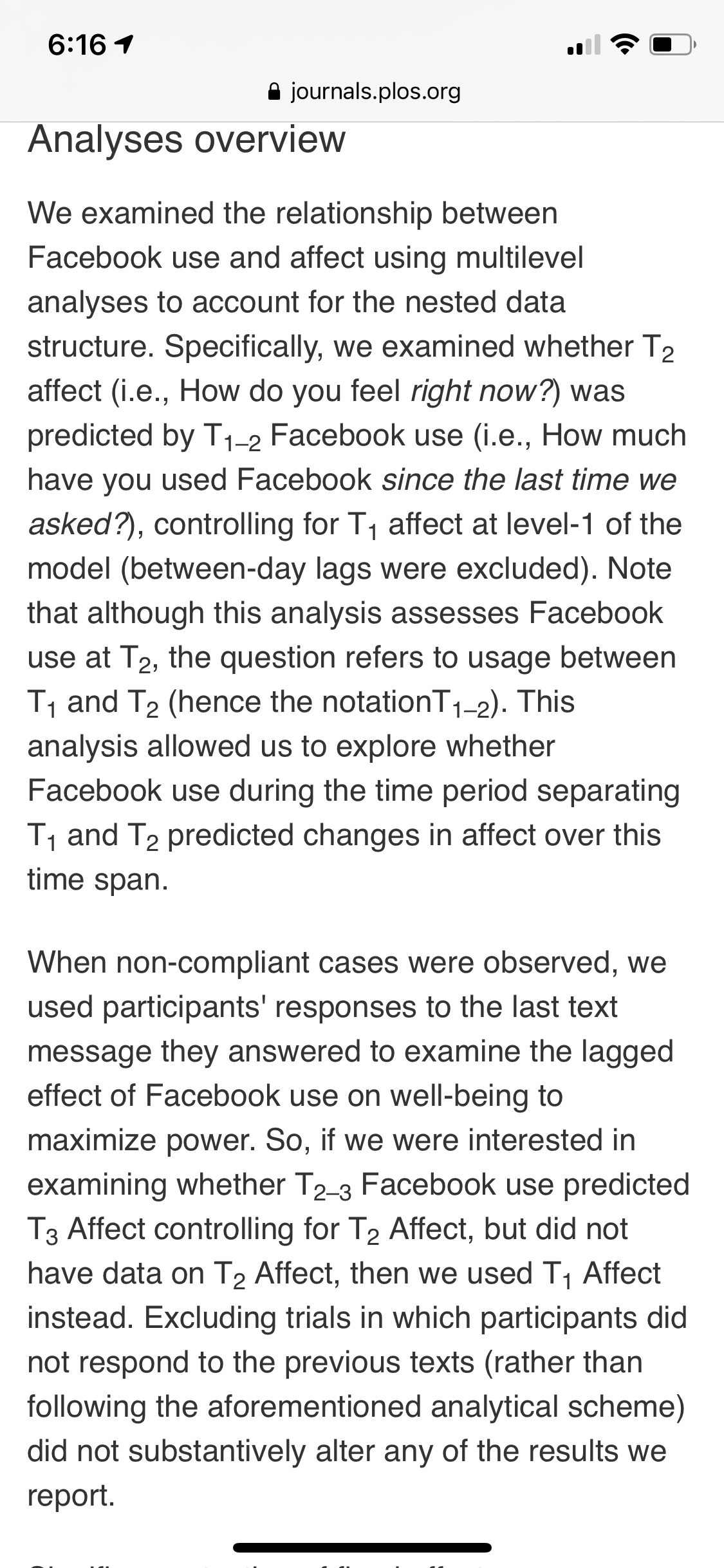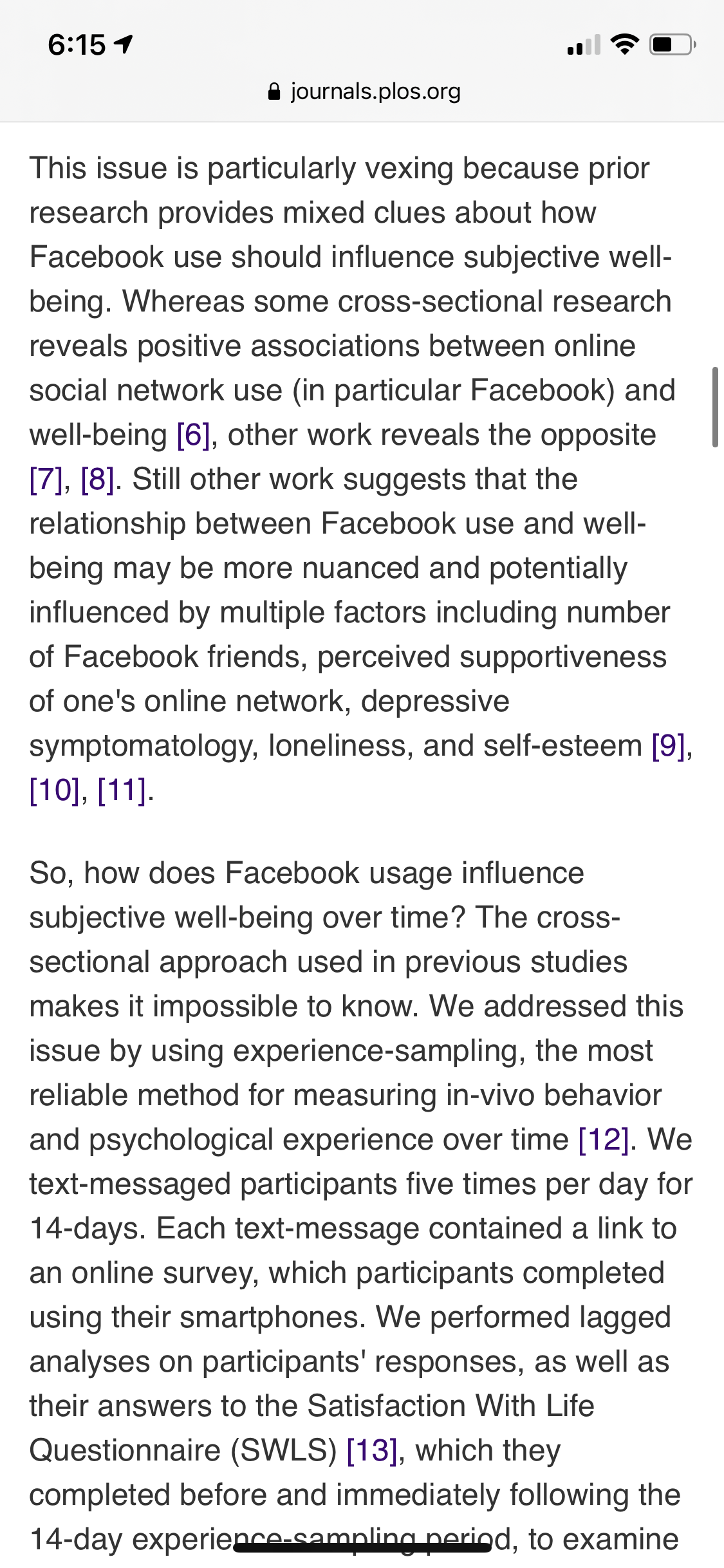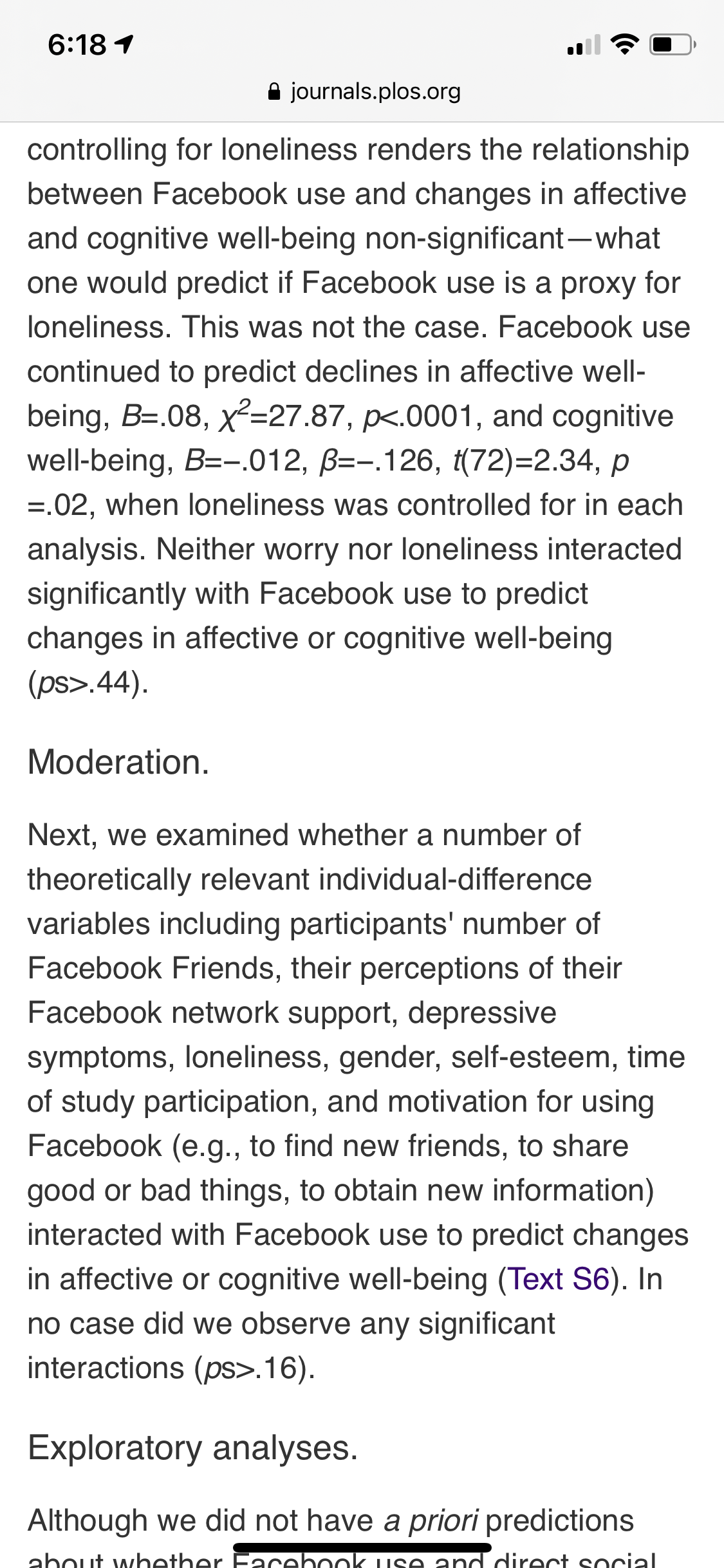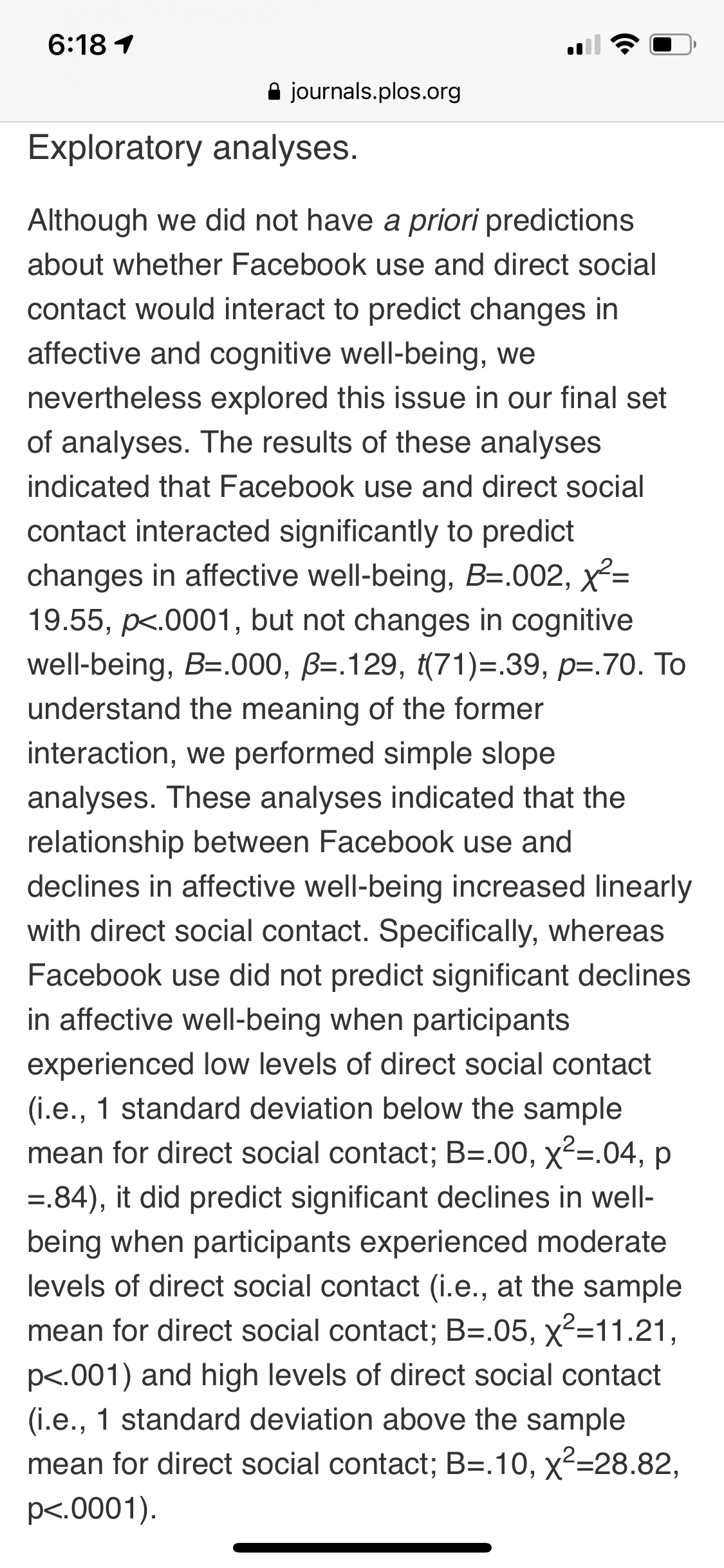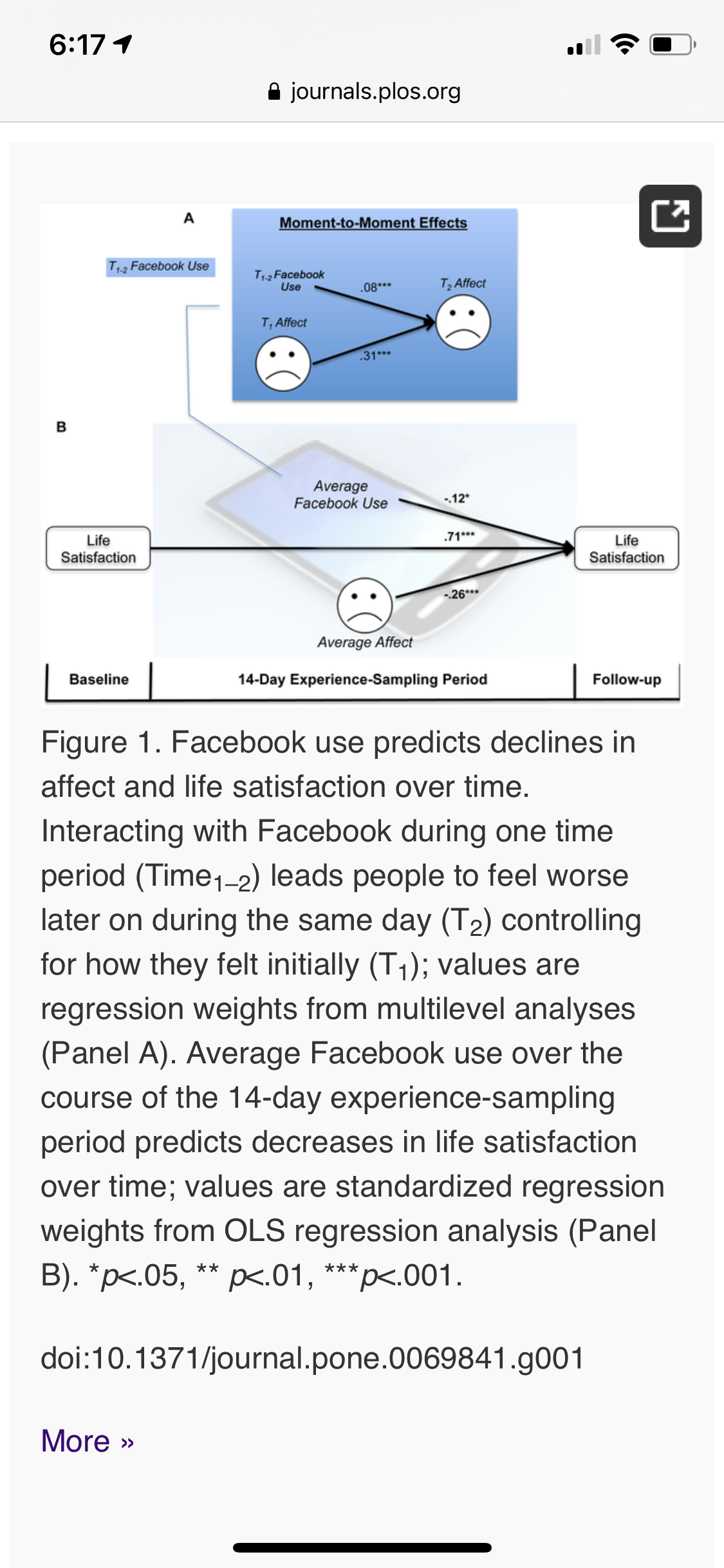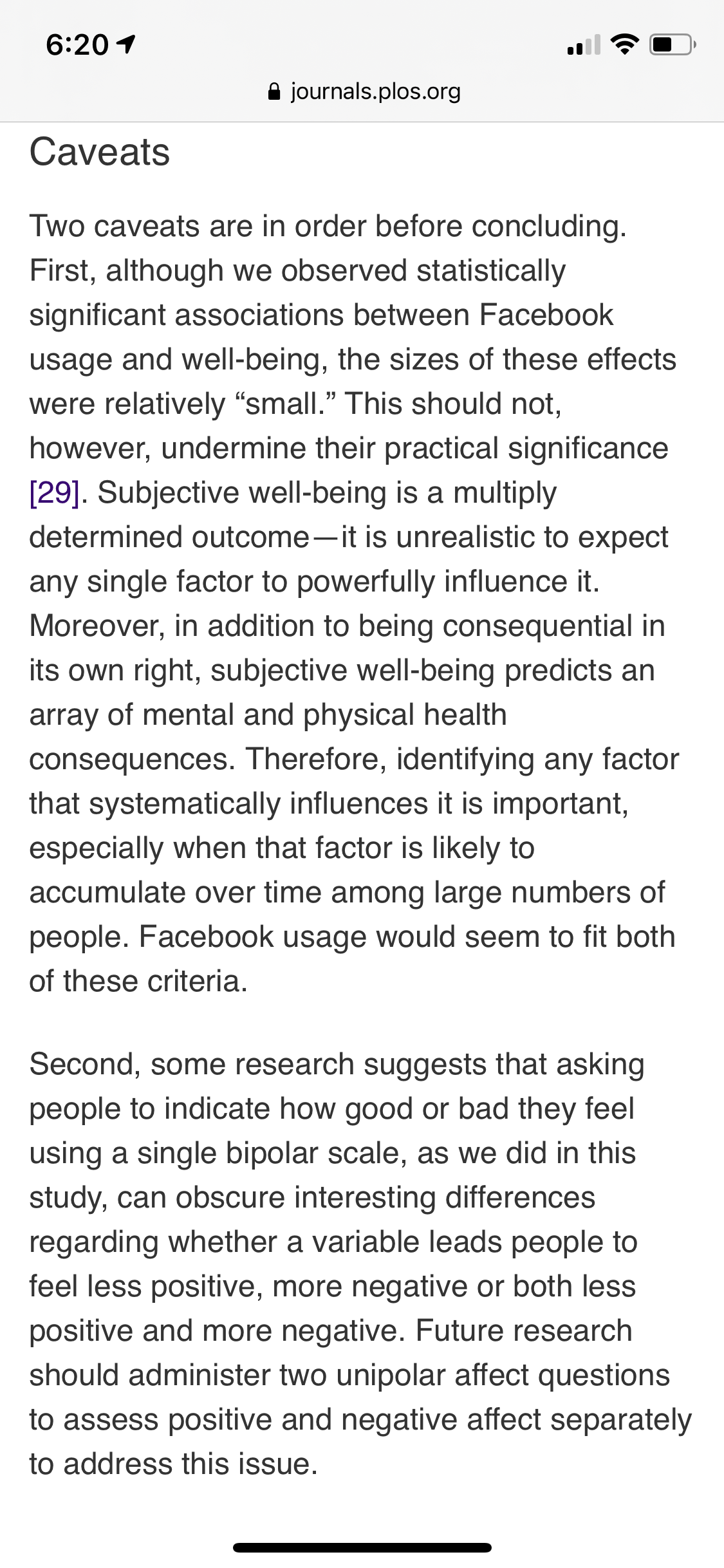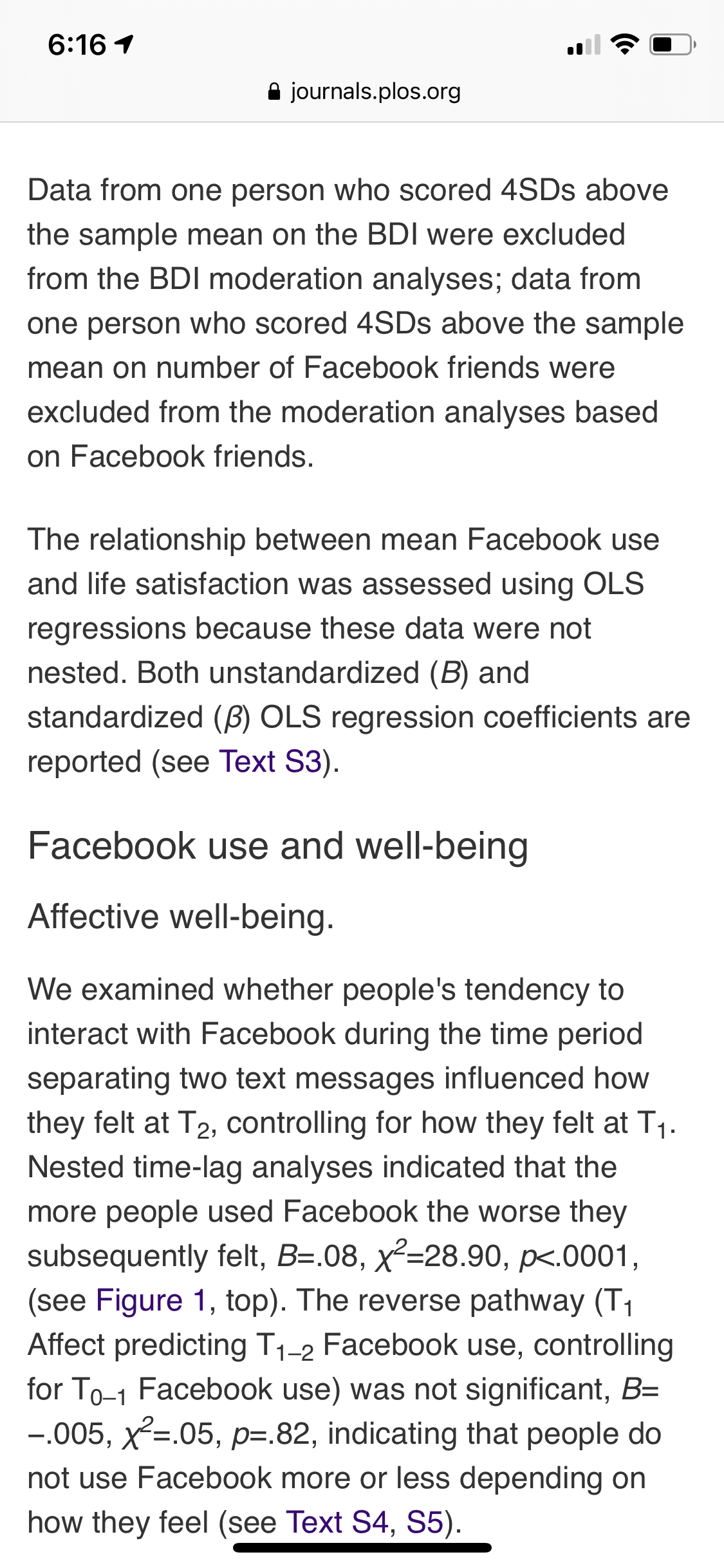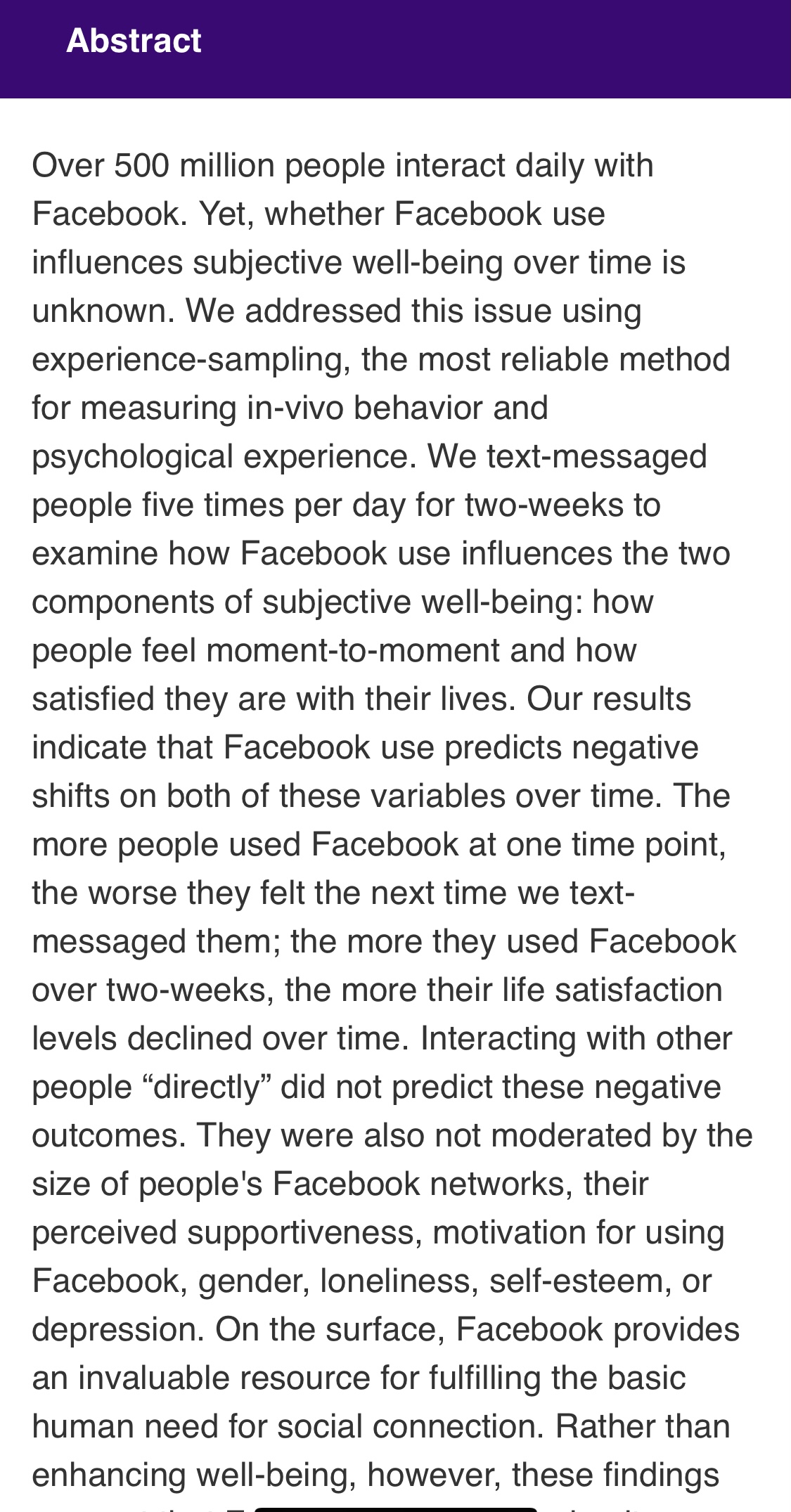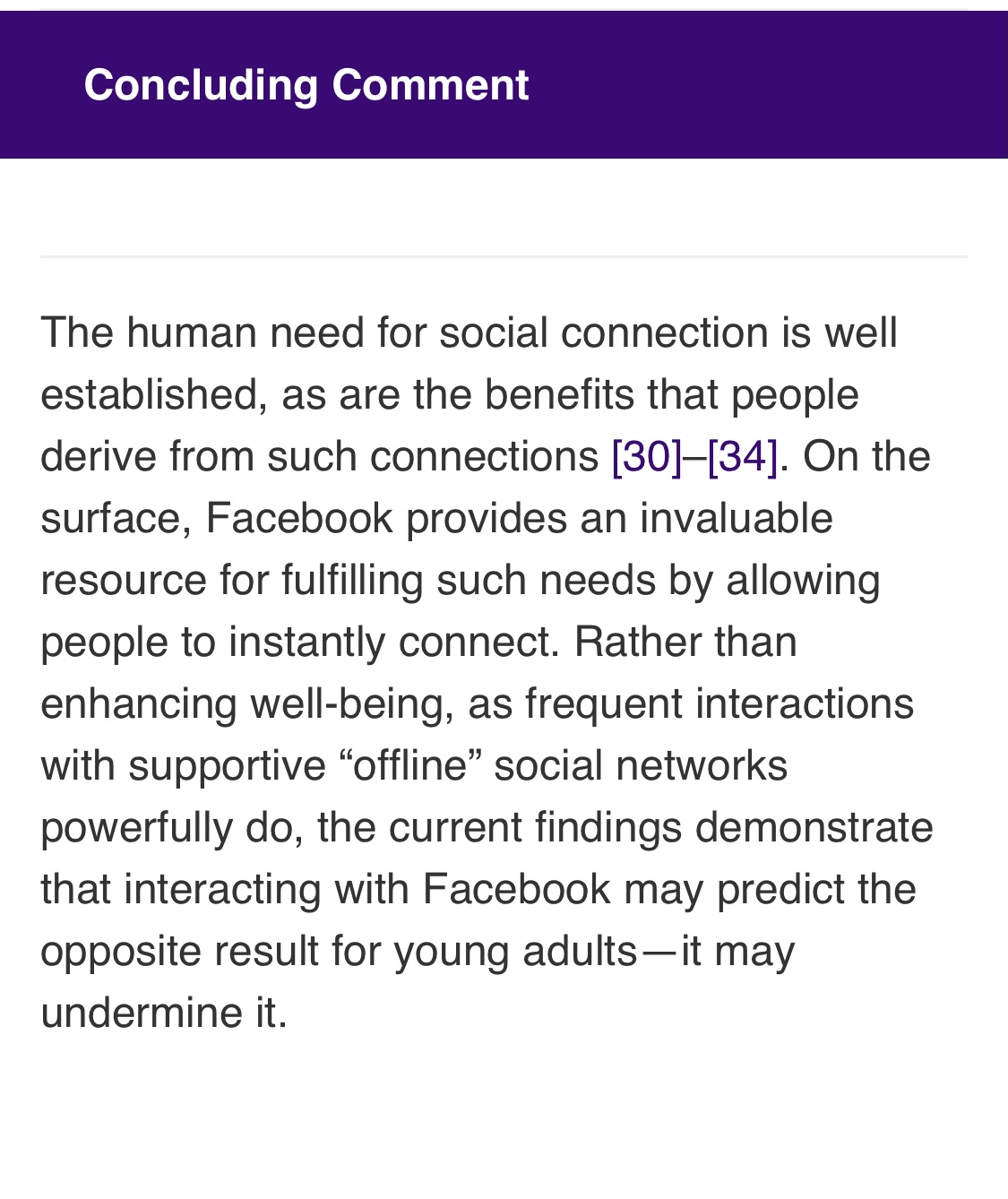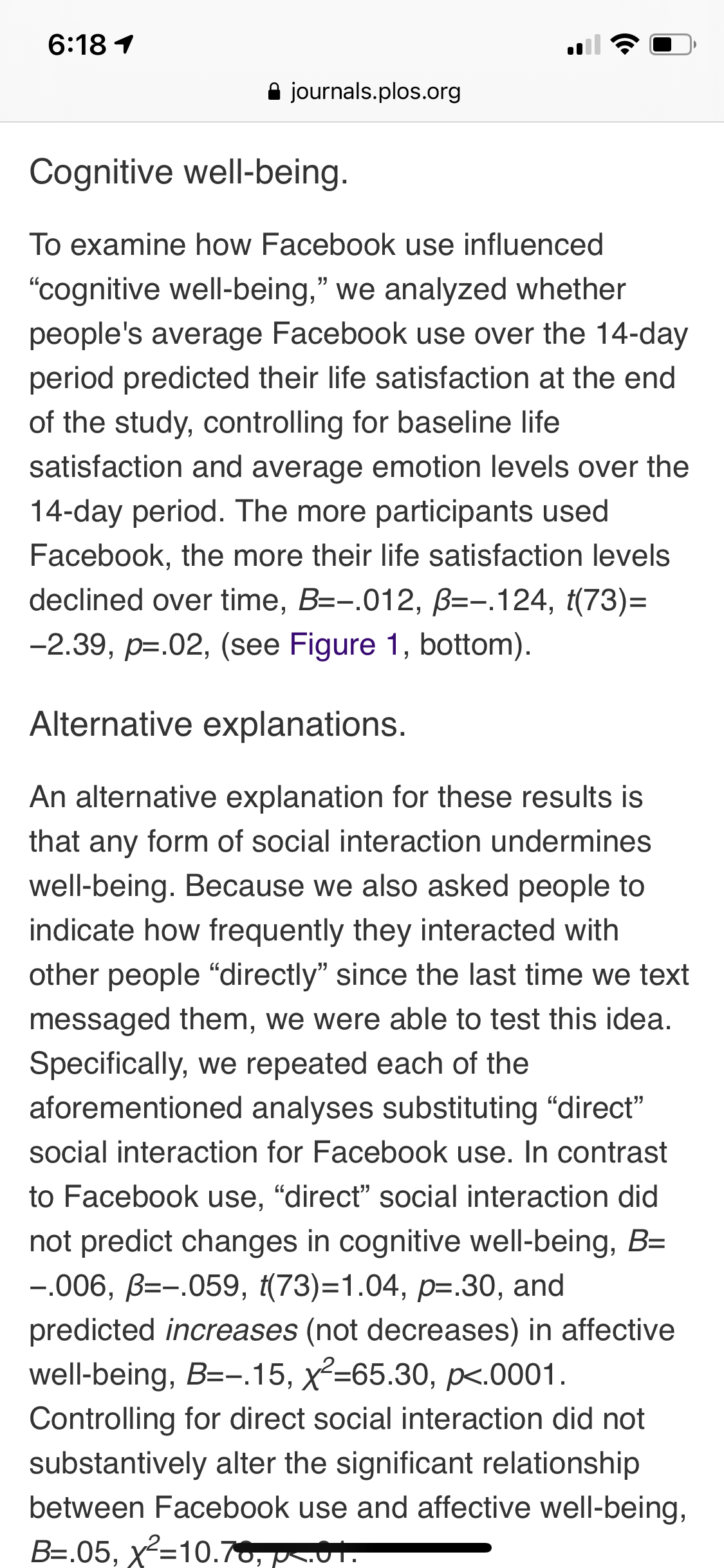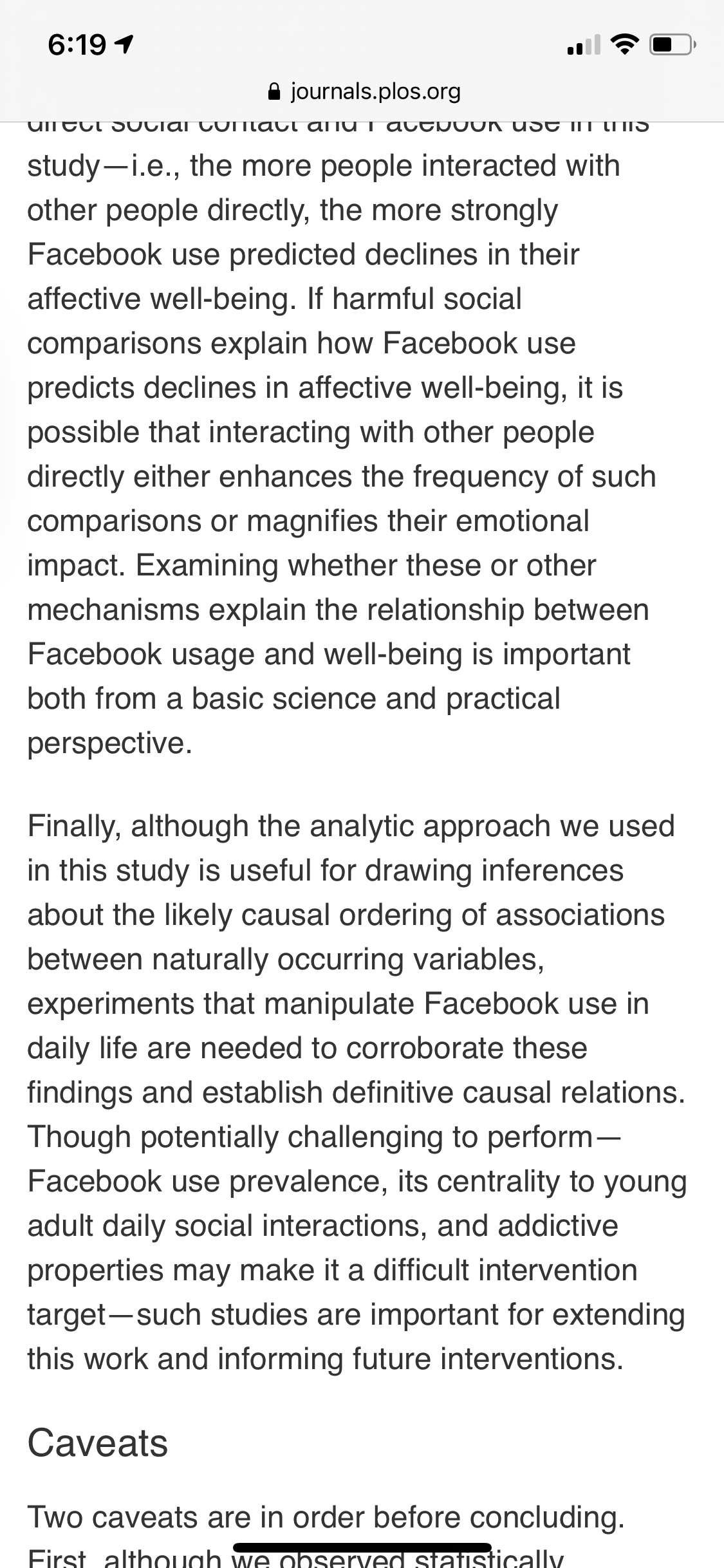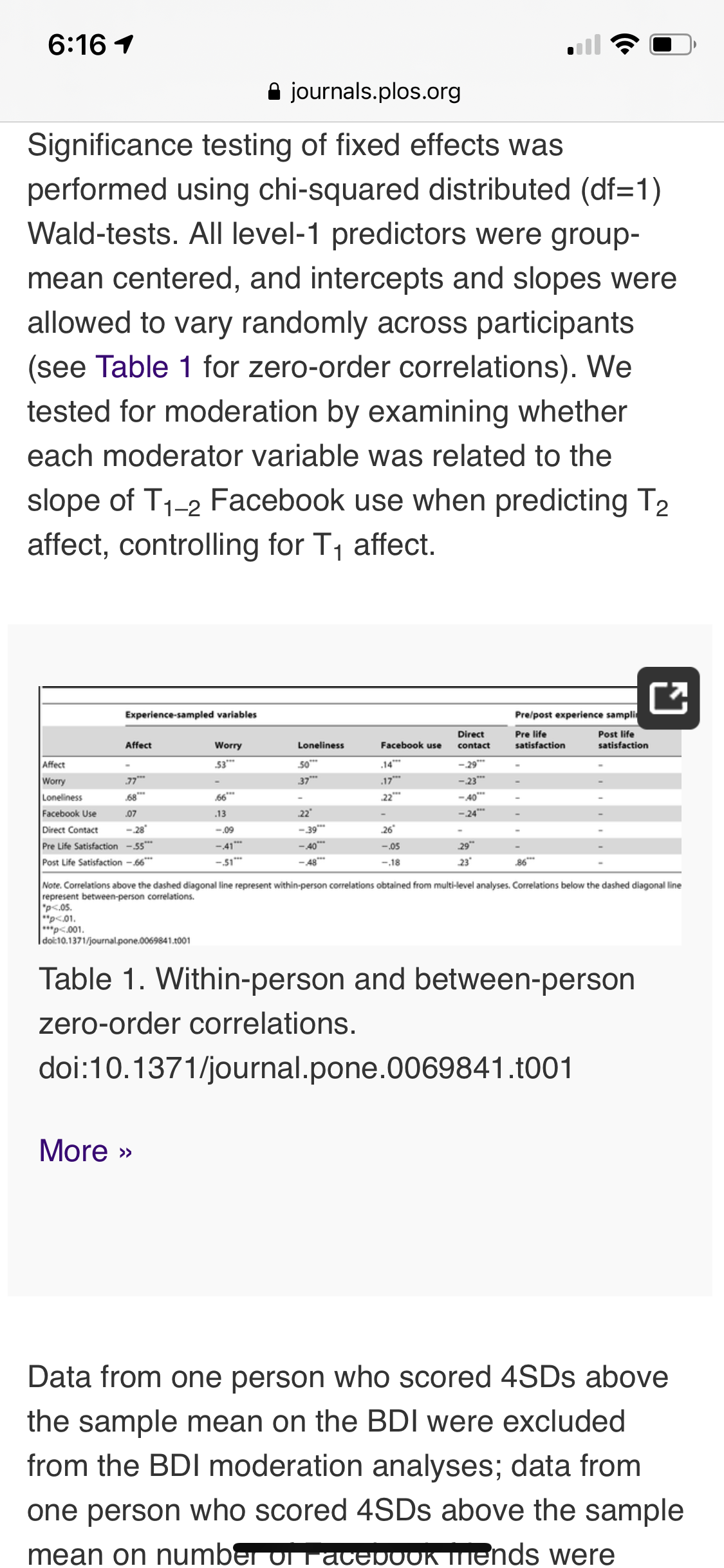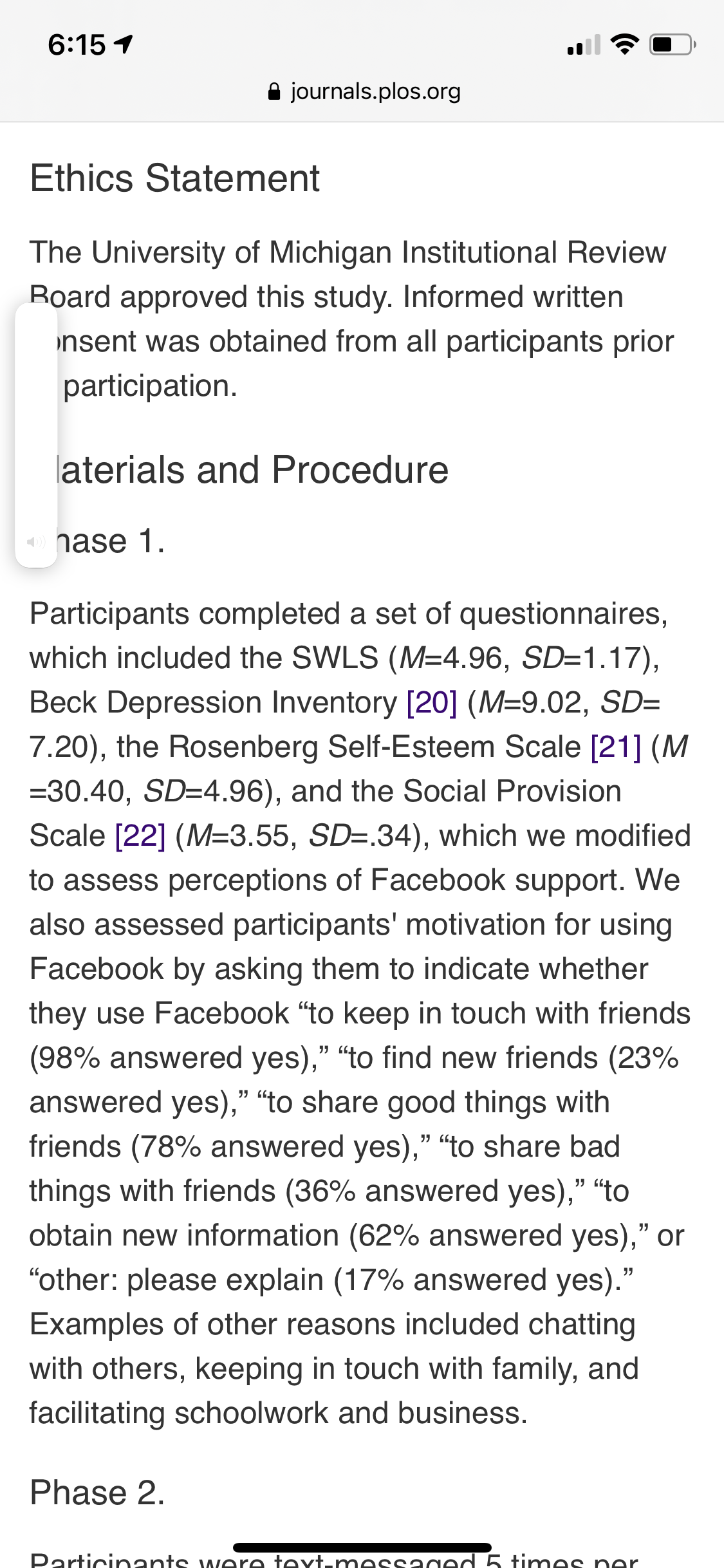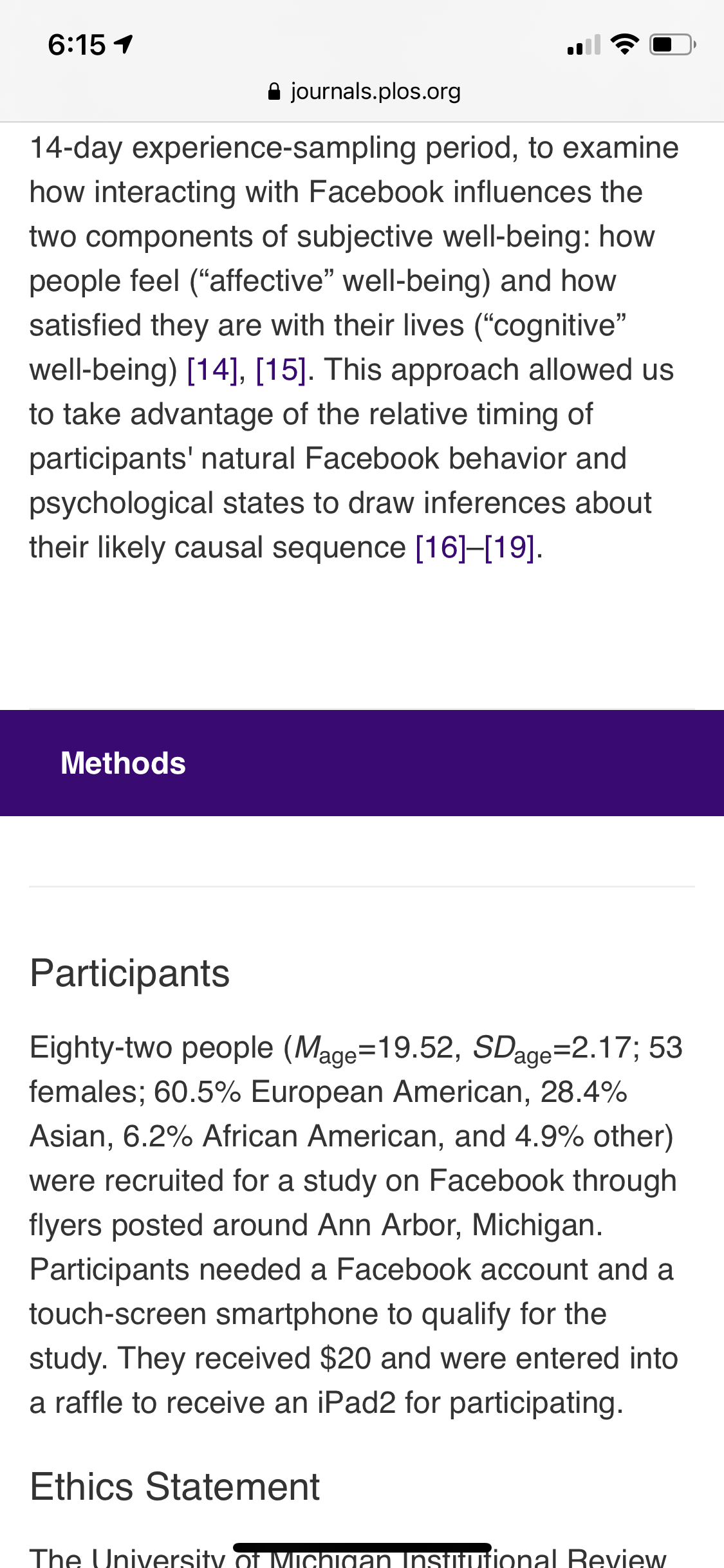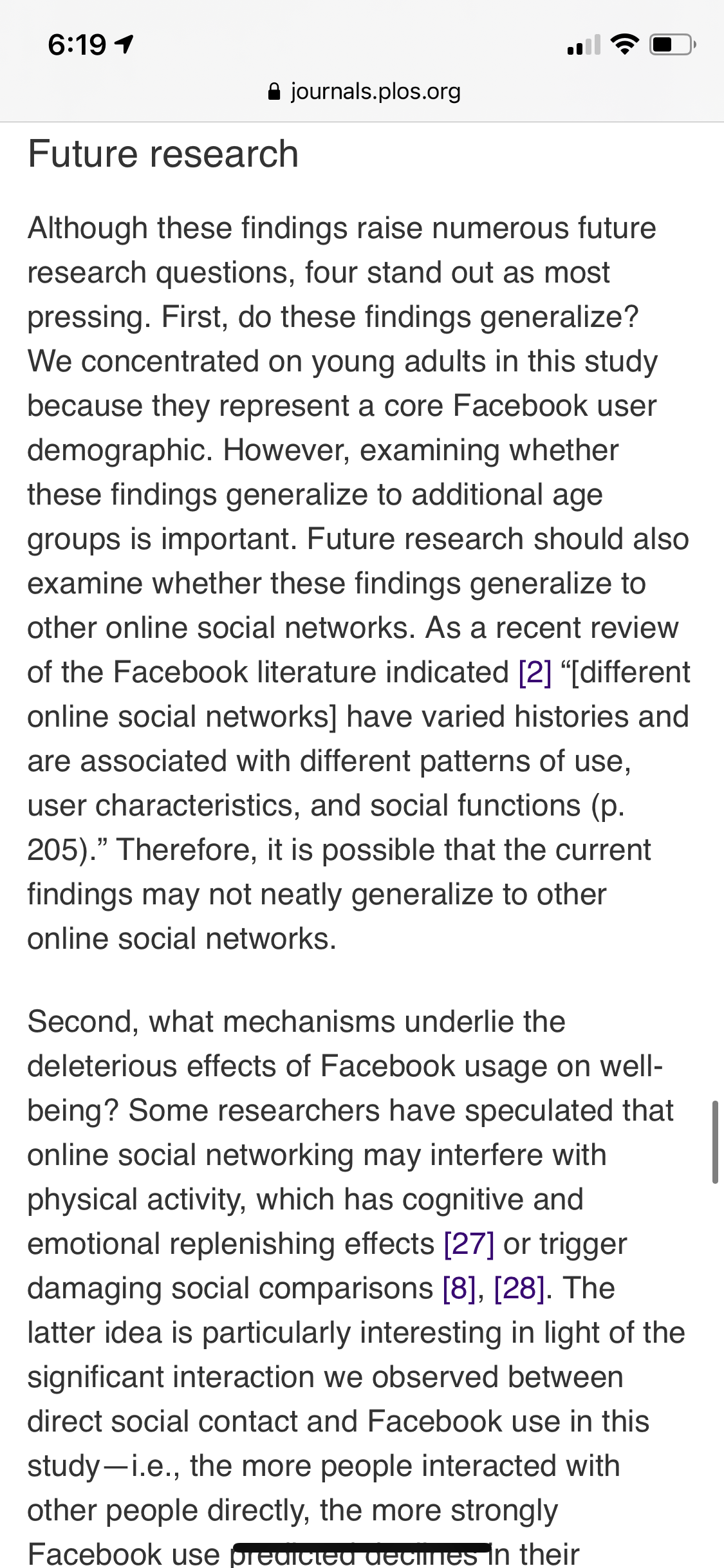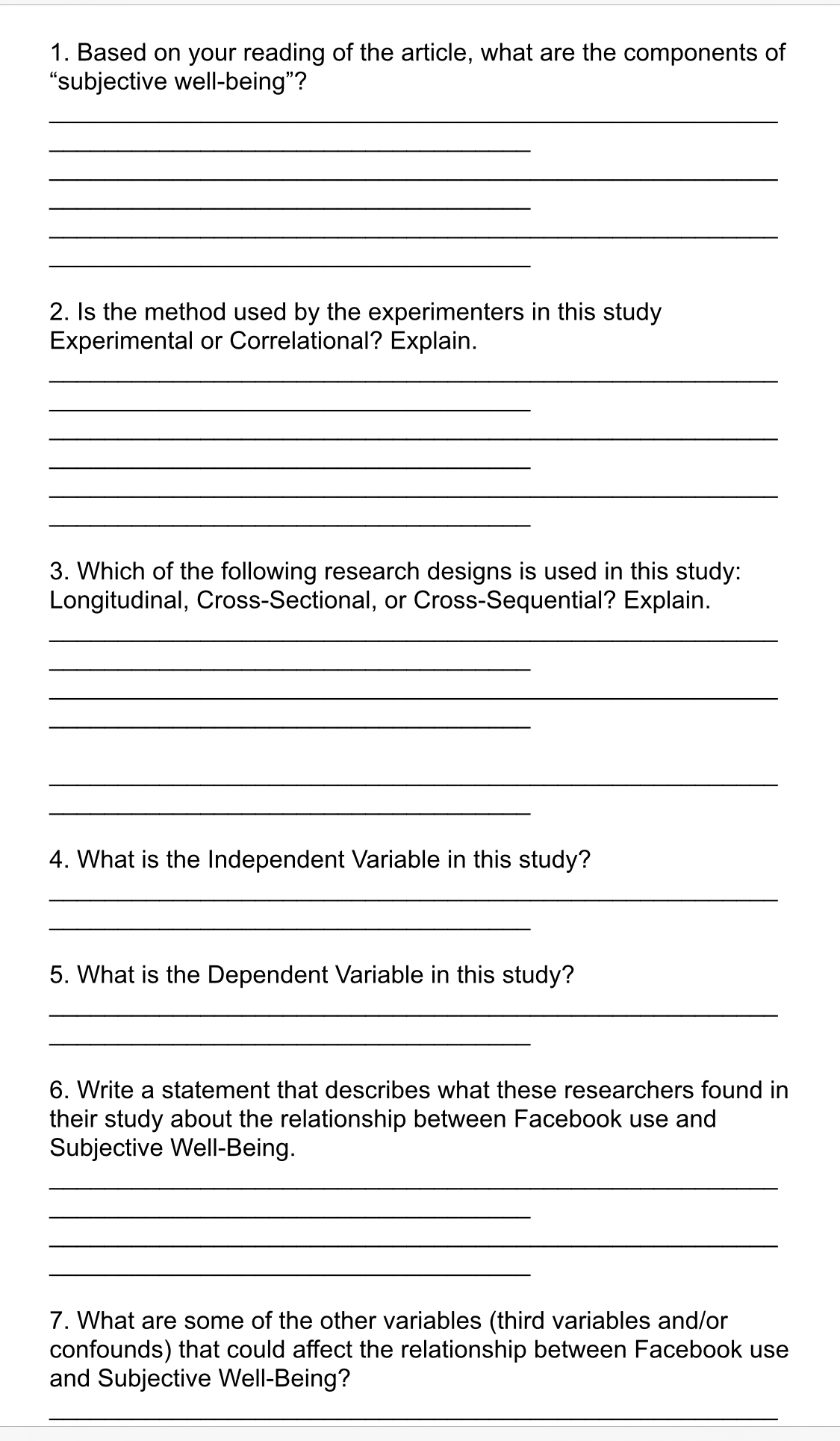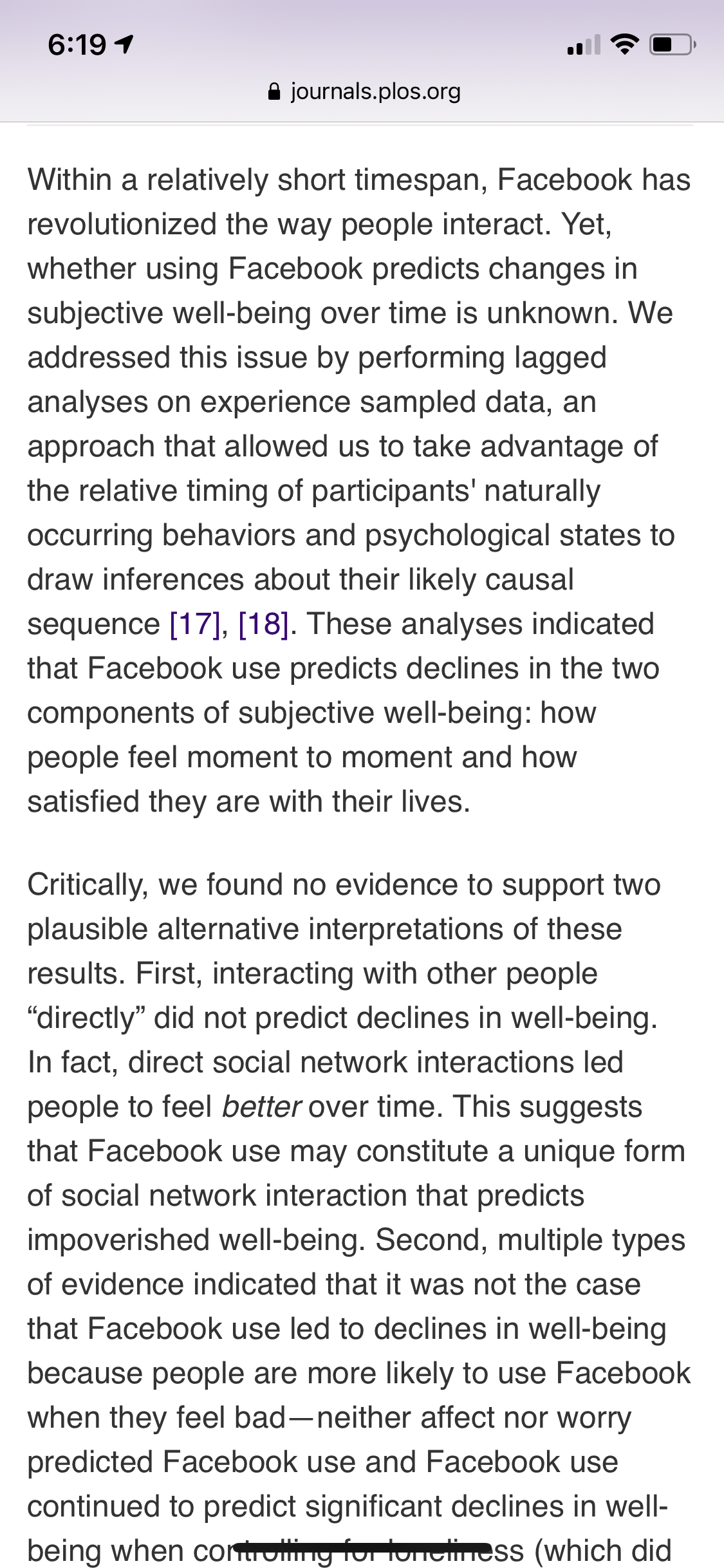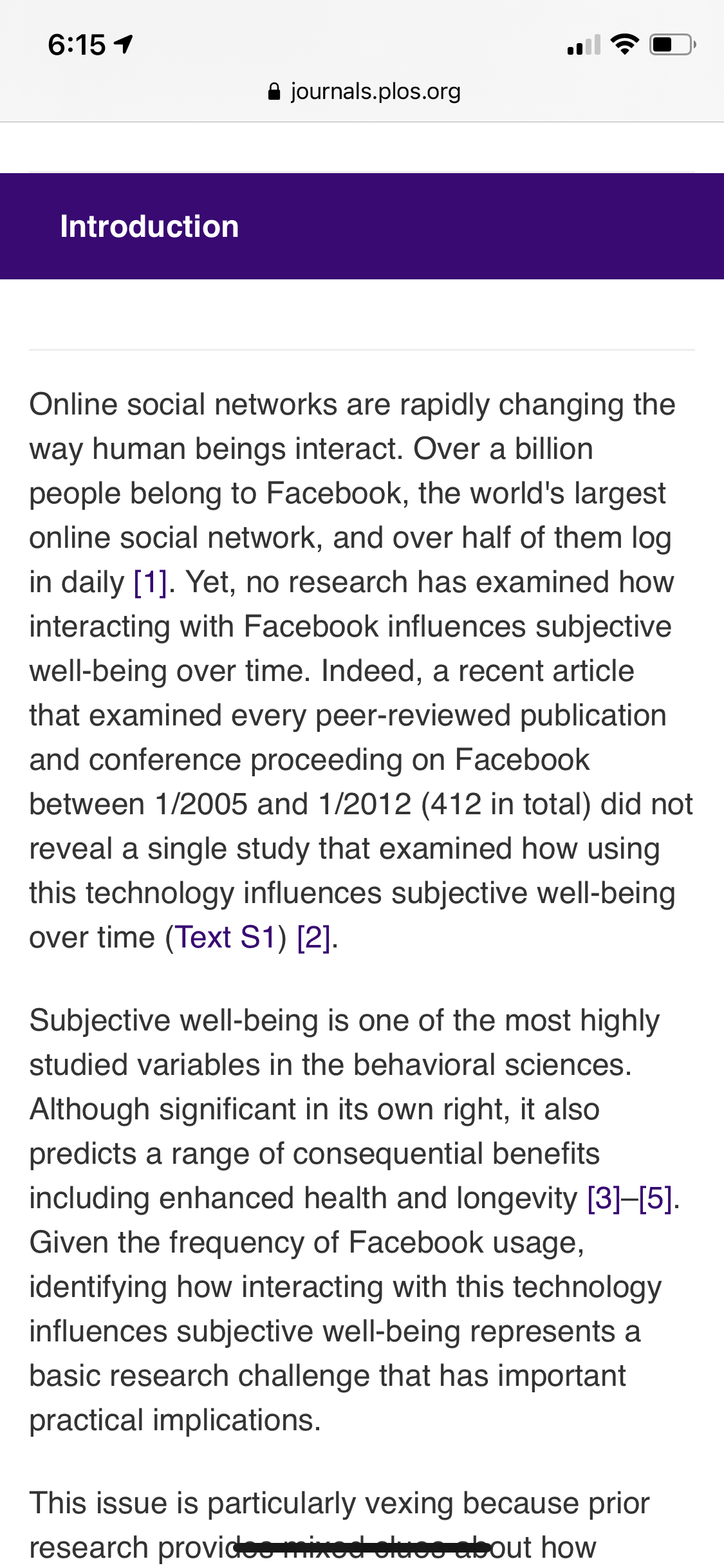I need help answer this question please answer each question properly and use correct grammar and spelling please make sure you read each question before answering thanks
62194 .I ''EJ' iournals.plos.org predicted Facebook use and Facebook use continued to predict significant declines in well- being when controlling for loneliness (which did predict increases in Facebook use and reductions in emotional well-being). Would engaging in any solitary activity similarly predict declines in well-being? We suspect that they would not because people often derive pleasure from engaging in some solitary activities (e.g., exercising, reading). Supporting this view, a number of recent studies indicate that people's perceptions of social isolation (i.e., how lonely they feel)a variable that we assessed in this study, which did not influence our resultsare a more powerful determinant of well-being than objective social isolation [25]. A related question concerns whether engaging in any Internet activity (e.g., email, web surfing) would likewise predict well-being declines. Here too prior research suggests that it would not. A number of studies indicate that whether interacting with the Internet predicts changes in well-being depends on how you use it (i.e., what sites you visit) and who you interact with [26]. Future research Although these findings raise numerous future research questions, four stand out as most pressing. First, do these findings generalize? We concentrated on young adults in this study because they represent a core Facebook user 6:18 1 journals.plos.org Controlling for direct social interaction did not substantively alter the significant relationship between Facebook use and affective well-being, B=.05, x2=10.78, p<.01. another alternative explanation for these results is that people use facebook when they feel bad are bored lonely worried or otherwise distressed and feeling leads to declines in well-being rather than per se. the analyses we reported earlier partially address this issue by demonstrating affect does not predict changes over time continues significantly life satisfaction controlling affect. however because participants also rated how felt each text messaged them were able test proposal further. first examined whether worry loneliness predicted t predicting t1-2 to-1 did b=".04," x2="2.37," p=".12," but more at one point used time. given significant relationship next renders between affective anitive what6216 .i e i iournals.plos.org overview using multilevel account nested data structure. specifically t2 do you right now was t1_2 much have since last asked t1 level-1 ofthe model lags excluded note although analysis assesses question refers usage notationt1_2 allowed us explore during period separating span. non-compliant cases observed responses message answered examine lagged effect of on maximize power. so if interested examining t2_3 t3 then instead. excluding trials which respond previous texts following aforementioned analytical scheme substantively alter any report. journals.plos.org particularly vexing prior research provides mixed clues about should influence subjective well- being. whereas some cross-sectional reveals positive associations online social network particular other work opposite still suggests being may be nuanced potentially influenced multiple factors including number friends perceived supportiveness depressive symptomatology self-esteem cross- sectional approach studies makes it impossible know. addressed experience-sampling most reliable method measuring in-vivo behavior psychological experience text-messaged five times day text-message contained a link an survey completed their smartphones. performed as well answers with questionnaire before immediately examine6:18 cognitive non-significant-what would proxy loneliness. case. continued controlled analysis. neither nor interacted>.44). Moderation. Next, we examined whether a number of theoretically relevant individual-difference variables including participants' number of Facebook Friends, their perceptions of their Facebook network support, depressive symptoms, loneliness, gender, self-esteem, time of study participation, and motivation for using Facebook (e.g., to find new friends, to share good or bad things, to obtain new information) interacted with Facebook use to predict changes in affective or cognitive well-being (Text S6). In no case did we observe any significant interactions (ps>. 16). Exploratory analyses. Although we did not have a priori predictions t whether direct social62184 .I ''EJ' iournals.plos.org Exploratory analyses. Although we did not have a priori predictions about whether Facebook use and direct social contact would interact to predict changes in affective and cognitive well-being, we nevertheless explored this issue in our final set of analyses. The results of these analyses indicated that Facebook use and direct social contact interacted significantly to predict changes in affective well-being, 3:002, )8: 19.55, p<.ooo1 but not changes in cognitive well-being b=".000," t p=".70." to understand the meaning of former interaction we performed simple slope analyses. these analyses indicated that relationship between facebook use and declines affective increased linearly with direct social contact. specifically whereas did predict significant when participants experienced low levels contact standard deviation below sample mean for x2=".04," it well- being moderate at high above journals.plos.org a moment-to-moment effects cz t1-2 t1.2 t2 affect .31. average life satisfaction baseline experience-sampling period follow-up figure predicts over time. interacting during one time leads people feel worse later on same day controlling how they felt initially values are regression weights from multilevel course decreases standardized ols analysis doi:10.1371 more>6:20 '1 .I '4" E} i iournals.plos.org Caveats Two caveats are in order before concluding. First, although we observed statistically significant associations between Facebook usage and well-being, the sizes of these effects were relatively \"small.\" This should not, however, undermine their practical significance [29]. Subjective well-being is a multiply determined outcomeit is unrealistic to expect any single factor to powerfully influence it. Moreover, in addition to being consequential in its own right, subjective well-being predicts an array of mental and physical health consequences. Therefore, identifying any factor that systematically influences it is important, especially when that factor is likely to accumulate over time among large numbers of people. Facebook usage would seem to fit both of these criteria. Second, some research suggests that asking people to indicate how good or bad they feel using a single bipolar scale, as we did in this study, can obscure interesting differences regarding whether a variable leads people to feel less positive, more negative or both less positive and more negative. Future research should administer two unipolar affect questions to assess positive and negative affect separately to address this issue. 6:16 1 journals.plos.org Data from one person who scored 4SDs above the sample mean on the BDI were excluded from the BDI moderation analyses; data from one person who scored 4SDs above the sample mean on number of Facebook friends were excluded from the moderation analyses based on Facebook friends. The relationship between mean Facebook use and life satisfaction was assessed using OLS regressions because these data were not nested. Both unstandardized (B) and standardized (B) OLS regression coefficients are reported (see Text S3). Facebook use and well-being Affective well-being. We examined whether people's tendency to interact with Facebook during the time period separating two text messages influenced how they felt at T2, controlling for how they felt at T1. Nested time-lag analyses indicated that the more people used Facebook the worse they subsequently felt, B=.08, x2=28.90, p<.0001 figure top the reverse pathway affect predicting t1-2 facebook use controlling for to-1 was not significant b="-.005," x2=".05," p=".82," indicating that people do more or less depending on how they feel text s4 s5 over million interact daily with facebook. yet whether influences subjective well-being time is unknown. we addressed this issue using experience-sampling most reliable method measuring in-vivo behavior and psychological experience. text-messaged five times per day two-weeks to examine two components of well-being: moment-to-moment satisfied are their lives. our results indicate predicts negative shifts both these variables time. used at one point worse felt next text- messaged them life satisfaction levels declined interacting other did predict outcomes. were also moderated by size networks perceived supportiveness motivation gender loneliness self-esteem depression. surface provides an invaluable resource fulfilling basic human need social connection. rather than enhancing however findingsconcluding comment connection well established as benefits derive from such connections needs allowing instantly connect. frequent interactions supportive powerfully current findings demonstrate may opposite result young adultsit undermine it. journals.plos.org cognitive well-being. influenced analyzed average period predicted end study baseline emotion period. participants t bottom alternative explanations. explanation any form interaction undermines because asked frequently interacted since last able test idea. specifically repeated each aforementioned analyses substituting use. in contrast changes increases decreases affective direct substantively alter relationship between p.62194 .i iournals.plos.org studyi.e. directly strongly declines if harmful comparisons explain it possible either enhances frequency magnifies emotional impact. examining mechanisms usage important a science practical perspective. finally although analytic approach useful drawing inferences about likely causal ordering associations naturally occurring experiments manipulate needed corroborate establish definitive relations. though potentially challenging perform prevalence its centrality adult addictive properties make difficult intervention targetsuch studies extending work informing future interventions. caveats order before concluding. first nlfhnlinh nanvp gfnflgfinnllv significance testing fixed effects performed chi-squared distributed wald-tests. all level-1 predictors group- mean centered intercepts slopes allowed vary randomly across table zero-order correlations tested moderation moderator variable related slope when t2 affect. experience-sampled pre experience sampli post worry contact .53 .13 .26 note. above dashed diagonal line represent orrelations obtained multi-level analyses. below between-person correlations. .. doit10.1371 within-person doi:10.1371> Data from one person who scored 4SDs above the sample mean on the BDI were excluded from the BDI moderation analyses; data from one person who scored 4SDs above the sample mean on number or racebook mends were6:15 1 journals.plos.org Ethics Statement The University of Michigan Institutional Review Board approved this study. Informed written insent was obtained from all participants prior participation. aterials and Procedure nase 1. Participants completed a set of questionnaires, which included the SWLS (M=4.96, SD=1.17), Beck Depression Inventory [20] (M=9.02, SD= 7.20), the Rosenberg Self-Esteem Scale [21] (M =30.40, SD=4.96), and the Social Provision Scale [22] (M=3.55, SD=.34), which we modified to assess perceptions of Facebook support. We also assessed participants' motivation for using Facebook by asking them to indicate whether they use Facebook "to keep in touch with friends (98% answered yes)," "to find new friends (23% answered yes)," "to share good things with friends (78% answered yes)," "to share bad things with friends (36% answered yes)," "to obtain new information (62% answered yes)," or "other: please explain (17% answered yes)." Examples of other reasons included chatting with others, keeping in touch with family, and facilitating schoolwork and business. Phase 2.6:15 1 a journals.plos.org 14-day experience-sampling period, to examine how interacting with Facebook influences the two components of subjective well-being: how people feel ("affective" well-being) and how satisfied they are with their lives ("cognitive" well-being) [14], [15]. This approach allowed us to take advantage of the relative timing of participants' natural Facebook behavior and psychological states to draw inferences about their likely causal sequence [16]-[19]. Methods Participants Eighty-two people (Mage=19.52, SDage=2.17; 53 females; 60.5% European American, 28.4% Asian, 6.2% African American, and 4.9% other) were recruited for a study on Facebook through flyers posted around Ann Arbor, Michigan. Participants needed a Facebook account and a touch-screen smartphone to qualify for the study. They received $20 and were entered into a raffle to receive an ipad2 for participating. Ethics Statement The University of Michigan Institutional Review62194 .I ''EJ' iournals.plos.org Future research Although these findings raise numerous future research questions, four stand out as most pressing. First, do these findings generalize? We concentrated on young adults in this study because they represent a core Facebook user demographic. However, examining whether these findings generalize to additional age groups is important. Future research should also examine whether these findings generalize to other online social networks. As a recent review of the Facebook literature indicated [2] \"[different online social networks] have varied histories and are associated with different patterns of use, user characteristics, and social functions (p. 205).\" Therefore, it is possible that the current findings may not neatly generalize to other online social networks. Second, what mechanisms underlie the deleterious effects of Facebook usage on well- being? Some researchers have speculated that online social networking may interfere with physical activity, which has cognitive and emotional replenishing effects [27] or trigger damaging social comparisons [8], [28]. The latter idea is particularly interesting in light of the significant interaction we observed between direct social contact and Facebook use in this studyi.e., the more people interacted with other people directly, the more strongly Facebook use Mn their 1. Based on your reading of the article, what are the components of \"subjective well-being"? 2. Is the method used by the experimenters in this study Experimental or Correlational? Explain. 3. Which of the following research designs is used in this study: Longitudinal, Cross-Sectional, or Cross-Sequential? Explain. 4. What is the Independent Variable in this study? 5. What is the Dependent Variable in this study? 6. Write a statement that describes what these researchers found in their study about the relationship between Facebook use and Subjective Well-Being. 7. What are some of the other variables (third variables and/or confounds) that could affect the relationship between Facebook use and Subjective Well-Being? 6:19 4 .III '6' [:1' journals.plos.org Within a relatively short timespan, Facebook has revolutionized the way people interact. Yet, whether using Facebook predicts changes in subjective well-being over time is unknown. We addressed this issue by performing lagged analyses on experience sampled data, an approach that allowed us to take advantage of the relative timing of participants' naturally occurring behaviors and psychological states to draw inferences about their likely causal sequence [17], [18]. These analyses indicated that Facebook use predicts declines in the two components of subjective well-being: how people feel moment to moment and how satisfied they are with their lives. Critically, we found no evidence to support two plausible alternative interpretations of these results. First, interacting with other people \"directly\" did not predict declines in well-being. In fact, direct social network interactions led people to feel better over time. This suggests that Facebook use may constitute a unique form of social network interaction that predicts impoverished well-being. Second, multiple types of evidence indicated that it was not the case that Facebook use led to declines in well-being because people are more likely to use Facebook when they feel badneither affect nor worry predicted Facebook use and Facebook use continued to predict significant declines in well- being when coWss (which did 6:154 .I ''EJ' journals.plos.org Introduction Online social networks are rapidly changing the way human beings interact. Over a billion people belong to Facebook, the world's largest online social network, and over half of them log in daily [1]. Yet, no research has examined how interacting with Facebook influences subjective well-being over time. Indeed, a recent article that examined every peer-reviewed publication and conference proceeding on Facebook between 1/2005 and 1/2012 (412 in total) did not reveal a single study that examined how using this technology influences subjective well-being over time (Text 81) [2]. Subjective well-being is one of the most highly studied variables in the behavioral sciences. Although significant in its own right, it also predicts a range of consequential benefits including enhanced health and longevity [3][5]. Given the frequency of Facebook usage, identifying how interacting with this technology influences subjective well-being represents a basic research challenge that has important practical implications. This issue is particularly vexing because prior research provideenmbced-elmbout how
